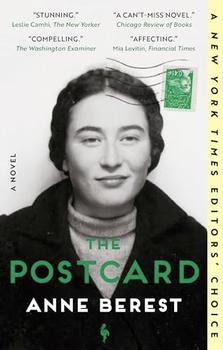Summary | Excerpt | Reading Guide | Reviews | Beyond the book | Read-Alikes | Genres & Themes | Author Bio

From the book
jacket: By the early l940s, when
Ukrainian-born Irène Némirovsky began
working on what would become Suite
Française—the first two parts of a
planned five-part novel—she was already
a highly successful writer living in
Paris. But she was also a Jew, and in
1942 she was arrested and deported to
Auschwitz: a month later she was dead at
the age of thirty-nine. Two years
earlier, living in a small village in
central France—where she, her husband,
and their two small daughters had fled
in a vain attempt to elude the Nazis—she'd
begun her novel, a luminous portrayal of
a human drama in which she herself would
become a victim.
The first part, "A Storm in June," opens
in the chaos of the massive 1940 exodus
from Paris on the eve of the Nazi
invasion during which several families
and individuals are thrown together
under circumstances beyond their
control. They share nothing but the
harsh demands of survival—some trying to
maintain lives of privilege, others
struggling simply to preserve their
lives—but soon, all together, they will
be forced to face the awful exigencies
of physical and emotional displacement,
and the annihilation of the world they
know. In the second part, "Dolce," we
enter the increasingly complex life of a
German-occupied provincial village.
Coexisting uneasily with the soldiers
billeted among them, the villagers—from
aristocrats to shopkeepers to
peasants—cope as best they can. Some
choose resistance, others collaboration,
and as their community is transformed by
these acts, the lives of these these men
and women reveal nothing less than the
very essence of humanity.
Comment: Suite Française
is a devastatingly poignant work, made
more so by the fact that the author was
fully cognizant of her situation and
correctly doubted that she would ever
live to complete her book. Despite
this she manages to write with an extraordinary degree of
sympathy and understanding for her
characters, both French and German, while consistently denouncing fear, cowardice and
acceptance of humiliation - even though
she stood effectively alone in doing so
as, according to the preface to the
first edition (published in France in
2004), it was rare to find any in the French literary world who did not collaborate
with the Nazis.
![]() This review was originally published in The BookBrowse Review in April 2006, and has been updated for the
April 2007 edition.
Click here to go to this issue.
This review was originally published in The BookBrowse Review in April 2006, and has been updated for the
April 2007 edition.
Click here to go to this issue.

If you liked Suite Francaise, try these:

by Anne Berest
Published 2024
Anne Berest's The Postcard is among the most acclaimed and beloved French novels of recent years. Luminous and gripping to the very last page, it is an enthralling investigation into family secrets, a poignant tale of mothers and daughters, and a vivid portrait of twentieth-century Parisian intellectual and artistic life.

by Jeanne Mackin
Published 2020
An American woman becomes entangled in the intense rivalry between iconic fashion designers Coco Chanel and Elsa Schiaparelli in this vivid novel from the acclaimed author of The Beautiful American.
There is no such thing as a moral or immoral book. Books are either well written or badly written. That is all.
Click Here to find out who said this, as well as discovering other famous literary quotes!
Your guide toexceptional books
BookBrowse seeks out and recommends the best in contemporary fiction and nonfiction—books that not only engage and entertain but also deepen our understanding of ourselves and the world around us.